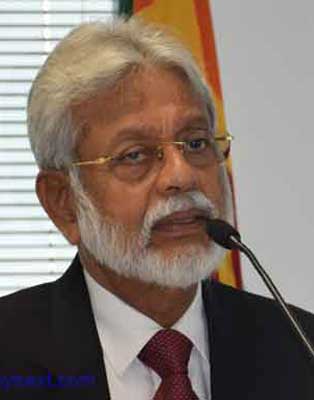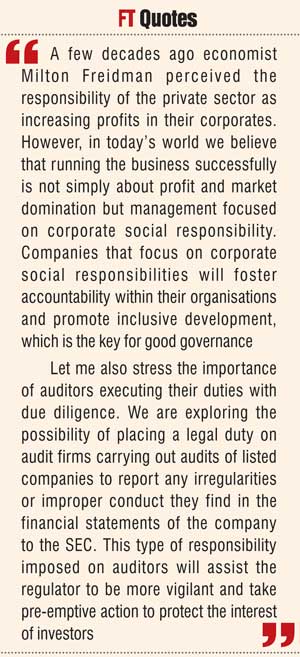Wednesday Feb 25, 2026
Wednesday Feb 25, 2026
Thursday, 14 May 2015 01:17 - - {{hitsCtrl.values.hits}}

|
Securities and Exchange Commission Chairman Thilak Karunaratne |
Securities and Exchange Commission Chairman Thilak Karunaratne last week stressed that effective corporate governance was not merely about complying with rules but also maintaining intellectual honesty and adhering to the true spirit of good governance.
He made this observation as the Chief Guest at the at the Certificate Award Ceremony of the Corporate Directors Programme, which was conducted jointly by the Institute of Chartered Accountants of Sri Lanka and the Securities and Exchange Commission of Sri Lanka.
The following are excerpts of Karunaratne’s speech.
First of all let me thank the organisers for inviting me to say a few words at this important function. I am also happy that the Securities and Exchange Commission of Sri Lanka (SEC) has collaborated with your institute in this initiative to inculcate a stronger culture of corporate governance and offer a program to young business leaders which will help them in their journey to face the challenges in the corporate world.
The Corporate Directors Programme is a distinct and timely initiative that is designed to enhance the knowledge and skills of directors in listed entities. Knowledgeable and progressive leadership in these companies indeed is important for the smooth functioning of the capital market. It is under such conditions that we at the SEC signed the MoU with CA Sri Lanka in May 2014 to provide financial assistance for this program.
I perceive this initiative as an ideal opportunity for directors to widen their knowledge on performance and conformance governance, corporate and social responsibility, financial and integrated reporting and applicable laws and regulations.
‘Yahapalanaya’ or good governance is a term that has become a salient feature in the winning formula in the election of leaders in this region in recent times.
The election campaigns of President Maithripala Sirisena of Sri Lanka, President Joko Widodo of Indonesia and Prime Minister Narendra Modi of India are important examples of this phenomenon. Further, the same theme is put into practice under the leadership of the President Xi Jinping of China in minimising corruption and creating a cleaner society in that country.
Inculcating good governance in a country would not be possible unless and until the essence of this ideology cascades down the line to all important segments inter alia the economy. Therefore I expect that this program, conducted jointly by CA Sri Lanka and the SEC, will provide the knowledge and skills required in promoting good governance - which in essence is corporate governance - within the respective organisations of the participants.
Transparency, accountability, risk management, credibility and prevention of concentration of power are the cornerstones of good governance. I am confident that this program would have addressed all these aspects through its curriculum.

However, I must stress here that effective corporate governance is not merely complying with rules, but is about intellectual honesty and adhering to the true spirit and essence of good governance.
A few decades ago economist Milton Freidman perceived the responsibility of the private sector as increasing profits in their corporates. However, in today’s world we believe that running the business successfully is not simply about profit and market domination but management focused on corporate social responsibility. Companies that focus on corporate social responsibilities will foster accountability within their organisations and promote inclusive development, which is the key for good governance. On the other side of the coin, companies will be able to enhance their brand image and reputation, foster a positive workplace environment, increase customer loyalty, etc. I am pleased to note that the program would have delved into this segment even further.
Financial and integrated reporting
Financial and integrated reporting is vital for a good governance framework. Integrated reporting will incorporate financial and non-financial information, thereby enabling stakeholders to understand how the organisation performs. An integrated report looks beyond the traditional timeframe and scope of the current financial reporting by addressing longer-term consequences of decisions and actions. It demonstrates the link between a strategy, governance and business model in an organisation that leads to transparency and credibility.
Awareness on relevant rules and regulations cannot be undermined when we talk of good governance within organisations. Directors should have a thorough understanding of relevant company law provisions, rules on risk management and compliance, listing rules of the Colombo Stock Exchange (CSE), employment regulations, etc.
Risk management and compliance is a pivotal requisite if we are to bring about a culture of good governance in organisations. Prudent risk management will increase efficiency in asset allocation, reduce waste, curb fraud, promote better management of contingent and maintenance activities, reduce cost of capital, etc.
Let me also stress the importance of auditors executing their duties with due diligence. We are exploring the possibility of placing a legal duty on audit firms carrying out audits of listed companies to report any irregularities or improper conduct they find in the financial statements of the company to the SEC. This type of responsibility imposed on auditors will assist the regulator to be more vigilant and take pre-emptive action to protect the interest of investors. This would lead to increased credibility and greater transparency of both listed companies and audited reports particularly in the mind of potential investors. This is a legal requirement present in other jurisdictions such as Malaysia.
Interdependence between governance and progressive leadership is seen in successful organisations. If you have leadership without governance you risk tyranny and fraud. If you have governance without leadership you risk atrophy, bureaucracy and indifference. Hence I urge directors to utilise the skills they acquire to become pragmatic leaders who would encompass the current changes in the corporate world when formulating and implementing strategies and business processes.
If directors execute their corporate roles prudently, our job as the regulator will be much easier. Their farsighted, informed and prudent decisions would encourage an efficient price discovery mechanism, increase market value, reduce systematic risk in the market and also result in a myriad of other positive factors.
This would pave the way towards attaining the cornerstones (transparency, sustainability, accountability, risk management, credibility and prevention of concentration of power) of good governance in society.
On that note, I take your leave and wish you all the very best in all your future endeavours.